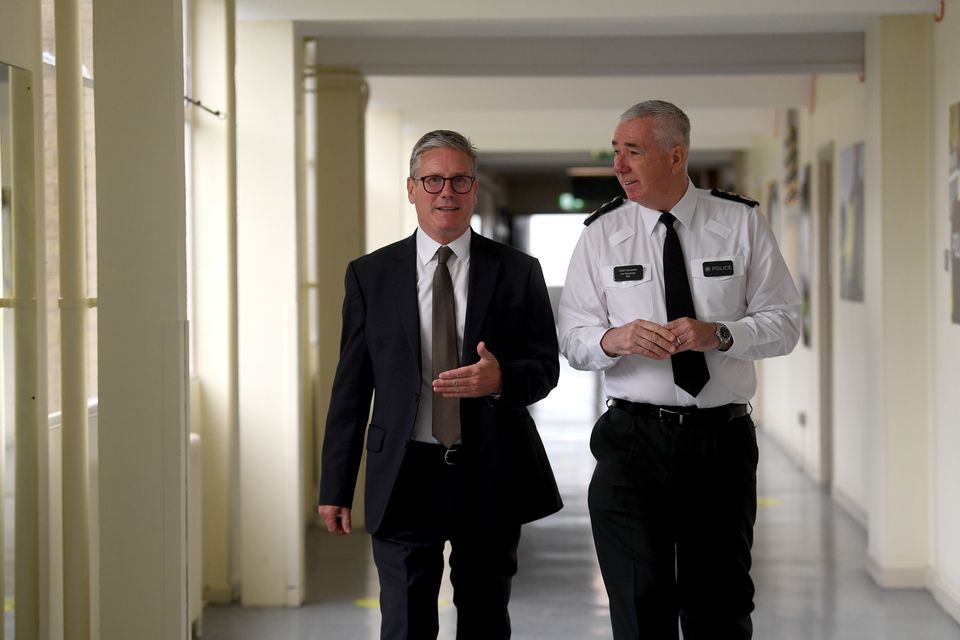The head of PSNI has said he has a “clear plan” to begin releasing images of people convicted of crimes in Northern Ireland from next year.
Chief Constable Jon Boutcher also issued a “stark warning” that “dangerously low” PSNI resources would have a serious impact on the force’s operational ability to tackle crime.
The PSNI does not issue mugshots of serious offenders after sentencing, unlike many police forces in other parts of the UK.
Following rioting that occurred in Belfast in August, some mugshots were released and the NI police chief has previously signalled he wants to make it a more routine policy.
Prime Minister Keir Starmer with PSNI Chief Constable Jon Boutcher during a visit to PSNI College at Garnerville in Belfast (Charles McQuillan/PA)
Mr Boutcher told the Policing Board: “I have a very clear plan next year – we have to cross all the t’s and dot the i’s but – to publish convicted photographs of people who committed these heinous crimes and their sentences as a deterrence.
“To actually show that if you commit these crimes, we will arrest you, we will prosecute you, we will convict you, and we will make it clear that you committed these crimes.
“And we took something of that approach with regards to the rioting that occurred in the summer, and by putting images out of those who are suspected of those offences.
“It was my intention, we changed our internal processes around publication of photographs of people convicted to show those people responsible for that disorder publicly through convicted photographs.
“We have not reached that point yet. You know, our justice process is slower than in England and Wales, we’ve not had that opportunity but it’s something I think we all share in.”
Mr Boutcher has been vocal about budget pressures facing the service, previously stating the organisation was facing a £37 million-a-year funding gap.
The chief constable also issued a “stark warning” that “dangerously low” PSNI resources would have a serious impact on the forces operational ability to tackle crime.
Mr Boutcher said crime levels in Northern Ireland “remain significantly lower than in England and Wales” but this “has not manifested itself in reduced demand as crime types have changed”.
He said: “We now have levels of demand regarding calls for concern and mental health related issues that quite simply overwhelm us.
“I’m incredibly concerned about those serious, high harm offenses, some of which have been reported in the media and we’ve spoken about at this board.
“I wish to be crystal clear that with our dangerously low resources, this means that people will come to harm who otherwise would not, and we will not be able to do what we need to do to prevent people from getting involved in crime, because simply, we have a lack of numbers of police officers in our communities.
“This is a stark warning for this board and everybody in Northern Ireland.
“I’m of the view that our effectiveness to tackle violence against women and girls has – and continues to – suffer significantly through a lack of police numbers. I am especially concerned about the impact on monitoring dangerous offenders.
“We need more resources, or there will be high harm crimes committed that could otherwise be prevented.”
Mr Boutcher welcomed the £36.7 million of funding for the PSNI announced by Justice Minister Naomi Long.
“This provides us with the ability to balance the books for at least this year. I’m particularly pleased that this announcement will enable progress to be made on this year’s outstanding officer pay awards.
“I thank the minister for her decision to prioritise support for policing during this monitoring round. I am really grateful for this.
“But, as welcome as the additional funding is, a recent budget planning exercise has highlighted that we face a pressure of over £100 million next year.
“A future budget that accounts for these pressures will provide us with financial stability and end the cycle of uncertainty that comes with having to rely on in-year funding. This is just not sustainable.
“Unless we are funded properly, staff morale, which has returned, will decline. Communities will be less safe, and we will not be able to target fully those high harm crimes that change people’s lives forever, such as violence against women and girls and hate crime.”
The chief constable also welcomed three new Assistant Chief Constables (ACCs), Davy Beck, Ryan Henderson and Melanie Jones to the PSNI’s leadership team.
He said: “Each one brings significant experience to the role. These substantive appointments provide leadership, certainty and clarity to everyone in the organisation, and for all of those people that we are actually here to serve.”
